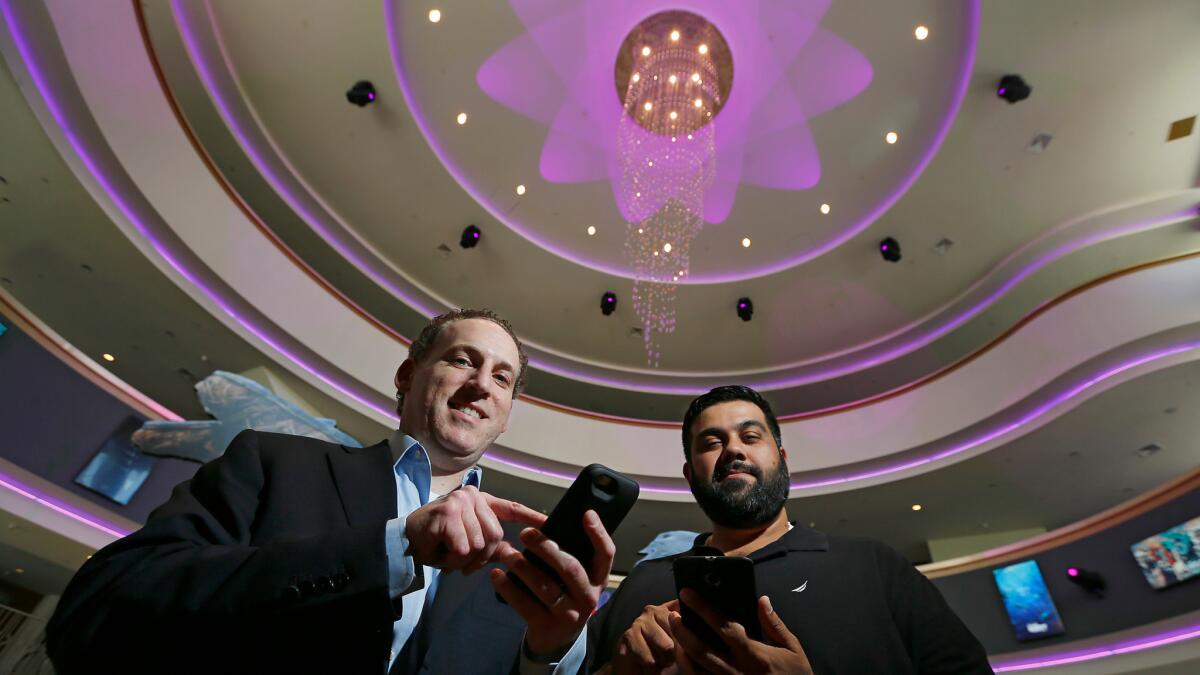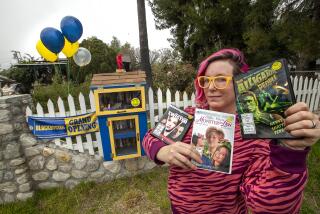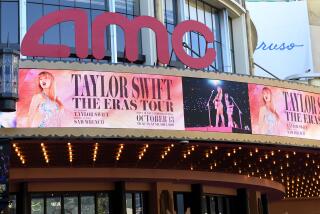This movie-ticket start-up says it can fill empty theaters across the country

The movie industry faces a persistent problem that even the biggest blockbusters can’t solve – empty auditoriums at theaters across the country. Some 5.5 billion seats go empty every year, roughly quadruple the number of tickets sold annually in the U.S. and Canada.
Enter Atom Tickets. The founders of the Santa Monica online ticket-selling start-up think their group-buying technology, discounts and data can help cinema owners fill more seats. After months of testing in small towns in the Midwest and the South, co-founders Matthew Bakal and Ameesh Paleja are preparing for their biggest bet yet – a nationwide expansion.
Atom Tickets will launch this weekend in Southern California, Atlanta and Nashville, Bakal and Paleja told The Times. Los Angeles theaters, including Regal L.A. Live and AMC Century City, will start using the technology for the July 4 weekend – a key holiday for the summer box office.
The app helps users organize groups of friends to decide on showtimes and pay for tickets. It also lets consumers order their popcorn and soda ahead of time, and offers deals on concessions.
Lionsgate Vice Chairman Michael Burns said Atom Tickets is tapping into a “terrific market opportunity” with its technology.
“We believe that this venture continues to bring us closer to our consumers, and it has the potential to revolutionize an industry,” Burns said.
It’s one of several tech companies seeking to help multiplexes lure younger patrons who don’t flock to theaters as frequently as previous generations did.
Los Angeles-based Dealflicks, which describes itself as Priceline for the movie business, says it offers discounts of up to 60% on tickets, while fellow New York-based start-up MoviePass has designed a subscription service that lets people go to a virtually unlimited number of films for $30 a month.
“Though discounts and incentives may fly in the face of the traditional ways, if history has taught us anything it’s that to sustain any business you must be malleable,” said Paul Dergarabedian, senior media analyst at ComScore.
Atom Tickets says it is attempting to address a critical problem: Going to the movies is a hassle. Getting a group of friends to agree on what movie to see, when and where to see it as well as how to pay for it can result in endless group texting.
Atom tries to simplify that process. If an Atom user wants to organize a group trip to see “Finding Dory” at Regal L.A. Live on a Friday night between 5 p.m. and 9 p.m., that person can easily send an invite to dozens of friends at once. Once the invitees agree on a showtime and select their tickets, each person pays for a ticket through the app.
Additionally, Atom Tickets says it can pool user information to make its own recommendations, similar to how Amazon and Netflix use data to make personalized suggestions.
For example, if the app learns that a group of five friends regularly goes to a local L.A. theater every three weeks and prefers sci-fi, Atom can send them notifications suggesting showtimes for upcoming films.
Atom also is experimenting with so-called flexible ticket pricing, which remains a controversial idea in the cinema business. Atom could get lower ticket prices for group purchases several weeks into a movie’s release. That could be an appealing proposition, given that average ticket prices hit a record $8.43 last year, according to the National Assn. of Theatre Owners.
Bakal said companies need to be willing to adapt to changing consumer behaviors in order to attract and keep young customers who have more entertainment options in the home.
Although the U.S.-Canada box office topped $11 billion for the first time last year, the number of actual tickets sold is still down significantly from its peak. And among young adults, the trends are more troubling. People aged 18 to 24 bought an average of 5.9 movie tickets last year, the lowest per capita attendance rate for that group in at least five years, according to the Motion Picture Assn. of America.
“Younger people are going less and less,” Bakal said. “If we don’t do something like this now, we’re going to lose this market.”
Bakal and Paleja founded Atom Tickets in 2014 and set up shop in a modest office at movie studio Lionsgate’s Santa Monica headquarters. Earlier this year, it raised $50 million in capital from Lionsgate, 20th Century Fox and the Walt Disney Co.
Chris Aronson, head of distribution for 20th Century Fox, said Atom has a “really good shot” of becoming successful.
“It’s a very robust mobile ticketing app that uses social media to help moviegoers connect with each other,” Aronson said.
Atom began its efforts by testing its system in Tennessee and Ohio. Attendance levels and concession sales increased by more than 10%, compared with similar theaters over the same period that didn’t use the app, Bakal and Paleja said.
It remains to be seen if it can boost the box office in major film markets such as Los Angeles. Nonetheless, analysts say cinema companies and studios need to try new ways of encouraging more people to go to theaters.
“It’s a way to try to increase ticket buying among the more youthful audience,” said Eric Handler, a media analyst at MKM Partners. “It’s something people are trying and experimenting with.”
The company plans to expand to 1,000 theaters, or 15,000 screens, by Labor Day, having secured partnerships with Regal Entertainment and AMC Entertainment, the country’s largest cinema chains. It’s currently available in about 60 theaters.
“We expect this ticketing innovation to bring more people into theatres more often,” said AMC Chief Content and Programming Officer Elizabeth Frank.
For now though, it will be nowhere near as ubiquitous as Fandango, which is available for 27,000 screens and is by far the largest online ticket seller. NBCUniversal owns Los Angeles-based Fandango, and Warner Bros. recently acquired a significant stake.
Discounting for the tickets themselves will take more time, said Bakal and Paleja.
Ticket prices are set by exhibitors, which have long-established deals in place with the studios that determine how box-office revenue is split. That means any changes to the ticket pricing framework will take significant effort.
Still, they say they expect the idea to eventually catch on.
“It’s something we’re going to continue testing,” Bakal said. “But it’s not the way Hollywood has done business over the last 100 years.”
MORE:
Summer movies: Watch the trailers
‘Finding Dory’ outswims ‘Independence Day,’ while ‘The Shallows’ surprises
5 horror movies to see this summer
‘Finding Dory’ and 9 other family-friendly movies to check out this summer
More to Read
From the Oscars to the Emmys.
Get the Envelope newsletter for exclusive awards season coverage, behind-the-scenes stories from the Envelope podcast and columnist Glenn Whipp’s must-read analysis.
You may occasionally receive promotional content from the Los Angeles Times.







